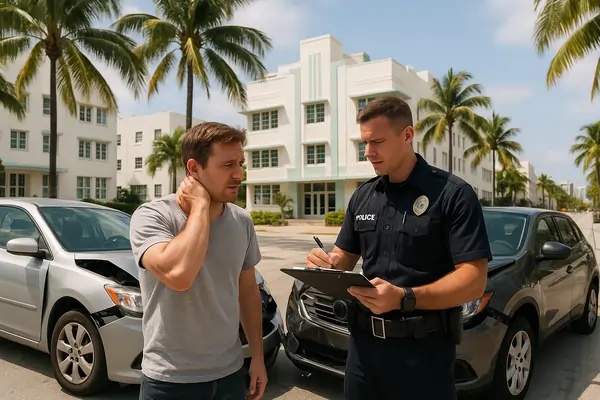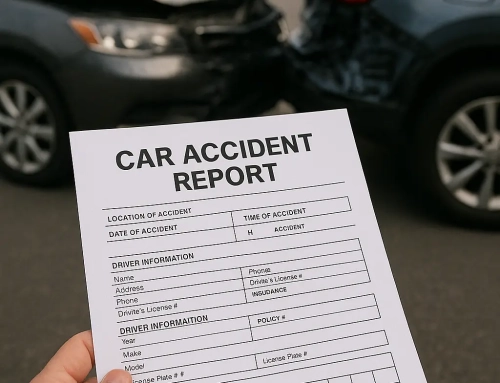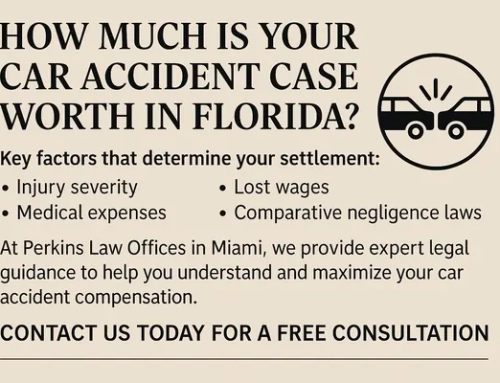Can I Still File a Claim If I Was Partially at Fault?
Yes, you can still file a claim if you were partially at fault. Car accidents rarely unfold in neat, black-and-white scenarios. Obviously your case will have more value and be easier to resolve if you are not arguably at fault or otherwise deemed comparatively negligent. In Florida, many collisions may be an he said she said and therefore involve shared fault—situations where both drivers bear some level of responsibility. The good news? Even if you believe you were partially at fault, you may still have the right to file a claim and recover compensation under Florida law.
At Perkins Law Offices in Miami, our team has represented countless accident victims who initially have been deemed partially at fault because the police report didn’t indicate a citation was issued or designated your vehicle as “vehicle 1” in the accident. Police usually designate the at fault vehicle in the report as “vehicle 1”. With the right legal strategy, many of those clients still received substantial settlements for their medical bills, lost wages, and pain and suffering. But it’s not as easy.
Understanding how Florida’s comparative negligence law works is critical to protecting your rights—and avoiding costly assumptions about fault that could limit your recovery. That is why hiring the best personal injury lawyer for your case that fits your needs and personality is critical.
Understanding Florida’s Comparative Negligence Law
Florida operates under a system known as comparative negligence, which means that fault and damages are divided according to each party’s level of responsibility in the accident. Florida used to be a pure form comparative fault state which meant one could be 99% of fault for their accident and still theoretically collect on 1%. However, that law was recently changed and now we have a modified contributory negligence state whereby if you are deemed 51% or more at fault you may not collect any money and are barred from compensation. But if you are less than 51% you may collect based your percentage of fault.
For example, if you were 20% at fault for a collision, your compensation may be reduced by that same percentage. If your total damages were valued at $100,000, you could still recover $80,000.
The important legal change to contributory negligence when over 50% fault is something every Florida driver needs to know.
As of March 24, 2023, Florida adopted a modified comparative negligence system under House Bill 837. Under this law, you cannot recover damages if you are found to be more than 50% at fault for the accident. This means that even a slight shift in the fault determination can decide whether or not you can file a successful claim.
That’s why it’s essential to speak with a Miami car accident lawyer who understands how to build a case that minimizes your degree of fault and protects your right to compensation.
What Happens If You Were Partially at Fault in a Florida Car Accident
Many accident victims assume that admitting even partial responsibility—like being slightly distracted or driving a few miles over the speed limit—automatically prevents them from filing a claim. That’s a dangerous misconception.
Insurance companies often exploit that uncertainty, rushing to assign blame or obtain statements that make you seem more responsible than you actually are. But in reality, fault is rarely straightforward.
An experienced Florida car accident attorney can help uncover crucial evidence, such as:
- Traffic camera footage that shows the other driver ran a red light.
- Accident reconstruction reports proving speed or distance miscalculations.
- Witness testimony that clarifies what actually happened seconds before impact.
- The best personal injury lawyers can analyze photos and statements and great alternative theories
Even if you believe you were partially at fault, you should never assume responsibility or admit guilt until an attorney has reviewed your case. The way fault is calculated can directly impact your ability to recover financial damages.
How Partial Fault Affects Compensation
Let’s say you were rear-ended at a stoplight but had a broken taillight at the time. The insurance adjuster might argue that your taillight contributed to the collision, assigning you 20% of the fault.
If your total losses—medical expenses, vehicle damage, and lost wages—amounted to $50,000, you could still recover $40,000 after the reduction.
But if the evidence shows that you were 51% responsible, you would lose your eligibility for compensation under Florida’s new rule.
That’s why having strong legal representation is crucial. Perkins Law Offices works meticulously to demonstrate that the other driver’s negligence played the dominant role in the crash. Through accident reconstruction experts, medical testimony, and legal analysis, our firm ensures that every detail supports your position.
Examples of Shared Fault Accidents
Partial fault can arise in countless ways on Florida roads. Some of the most common scenarios include:
- A driver speeding while another driver makes an unsafe left turn.
- Two vehicles merging at the same time, both failing to yield.
- One driver texting while the other fails to maintain a safe following distance.
- A driver not signaling before changing lanes, while the other is driving slightly over the limit.
In each of these examples, both drivers share some responsibility. But that doesn’t mean both lose their rights to compensation. The court determines each party’s percentage of fault, and the recovery is adjusted accordingly.
Why Legal Representation Makes the Difference
Florida’s shared fault law may seem straightforward, but proving percentages of negligence involves complex evidence, legal arguments, and negotiation tactics. Insurance companies use teams of lawyers and adjusters trained to minimize payouts—and without an experienced Miami personal injury lawyer, your side of the story may not be fully heard.
At Perkins Law Offices, we investigate every case from the ground up:
- We may reconstruct the accident using digital modeling and expert testimony.
- We review police reports and insurance statements to identify inconsistencies.
- We negotiate aggressively with insurers who attempt to unfairly increase your share of fault.
- We prepare every case for trial, ensuring the strongest possible position at every stage.
Attorney Alexander J. Perkins is known for his meticulous attention to evidence and unwavering advocacy for accident victims. As he often explains, “In shared fault cases, details determine outcomes. The right evidence can shift percentages—and that can mean the difference between winning or losing your claim.”
Common Misconceptions About Partial Fault in Florida Accidents
Myth #1: If I was even 1% at fault, I can’t recover anything.
False. You can recover damages as long as your fault is 50% or less under Florida’s modified comparative negligence law.
Myth #2: Insurance companies will be fair about assigning fault.
False. Insurers often overstate your fault percentage to reduce payouts. Always consult a lawyer before accepting their determination.
Myth #3: I don’t need a lawyer because it’s a small accident.
False. Even seemingly minor crashes can result in serious injuries that surface later. Without a legal advocate, you could settle for far less than you deserve.
Steps to Take If You Believe You Were Partially at Fault
If you’ve been in a crash and aren’t sure who’s to blame, follow these critical steps:
- Do not admit fault. Statements made at the scene can be used against you later.
- Contact law enforcement. Get an official accident report documenting all parties involved.
- Gather evidence. Take photos, exchange information, and obtain witness details.
- Seek medical attention immediately. Injuries that seem minor may worsen later.
- Call a car accident lawyer in Miami. An attorney will handle communications, investigate liability, and protect your rights under Florida law.
At Perkins Law Offices, we help clients understand how shared fault impacts their case, evaluate fault percentages, and pursue every avenue of compensation available.

Can I still file a claim if I was partially at fault?
Frequently Asked Questions (FAQs)
1. Can I still file a claim if I was partially at fault in Florida?
Yes. Under Florida’s comparative negligence law, you can still file a claim and recover compensation as long as you were 50% or less at fault for the accident.
2. What if I’m found to be more than 50% at fault?
If you are found to be more than 50% responsible, you cannot recover damages under the current Florida law. However, your attorney can challenge the fault determination with new evidence.
3. How is fault determined after a car accident?
Fault is determined using police reports, witness statements, accident reconstructions, traffic camera footage, and other forms of evidence.
4. Should I admit partial fault to my insurance company?
No. You should avoid admitting fault or apologizing, as even casual statements can be used against you during negotiations.
5. How can a Miami car accident lawyer help if I was partially at fault?
A skilled attorney can reduce your assigned fault percentage, gather evidence to strengthen your case, and negotiate a fair settlement that reflects your actual responsibility—not what insurers claim.
Contact Perkins Law Offices Today
If you’ve been involved in a car accident and believe you were partially at fault, don’t assume your case is lost. The law still allows you to recover compensation—but time and evidence are critical.
Contact Perkins Law Offices in Miami today for a free consultation. Our legal team will evaluate your situation, explain your rights under Florida’s comparative negligence law, and develop a strategy to maximize your recovery.





